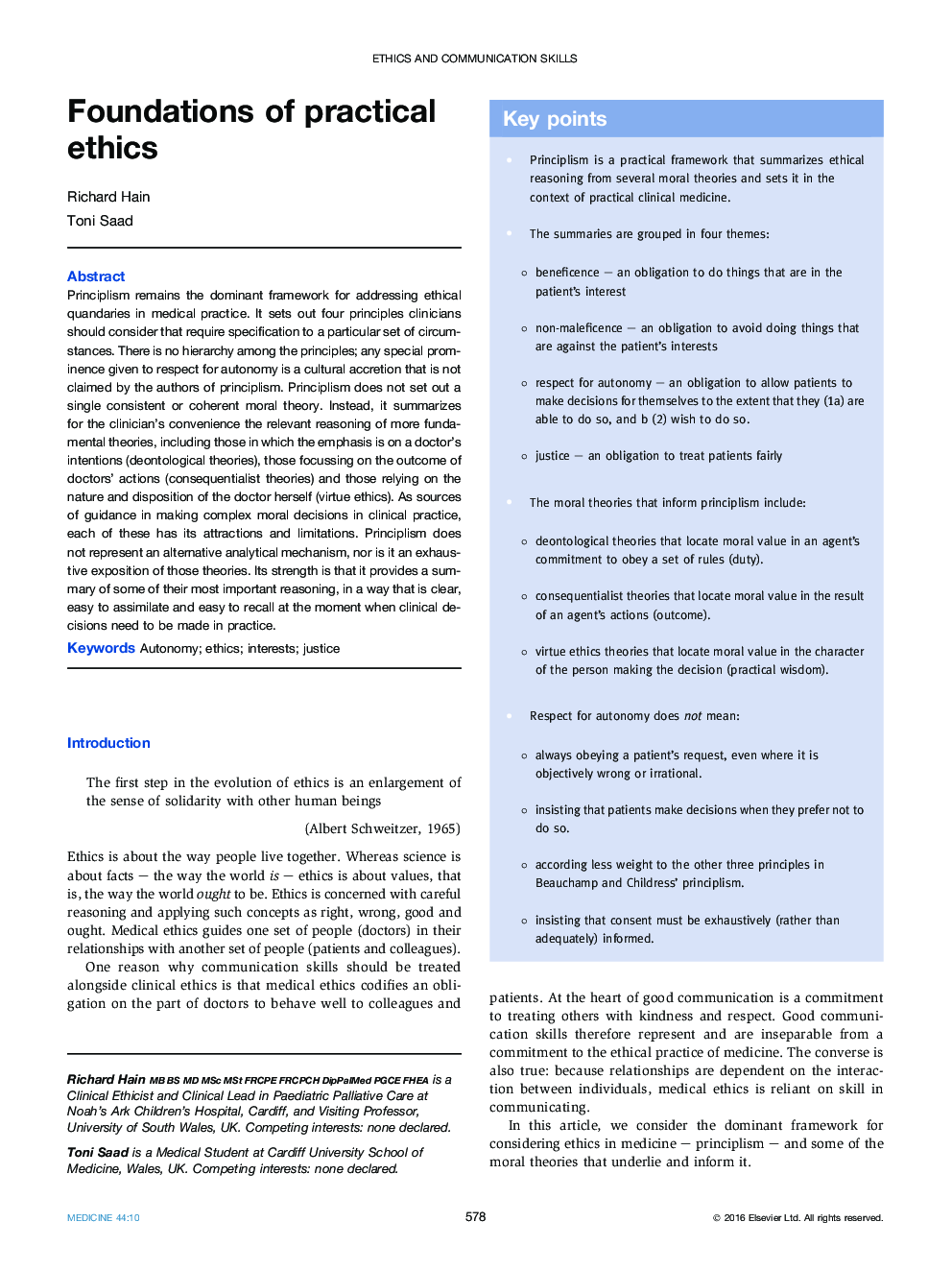| کد مقاله | کد نشریه | سال انتشار | مقاله انگلیسی | نسخه تمام متن |
|---|---|---|---|---|
| 5681213 | 1408814 | 2016 | 5 صفحه PDF | دانلود رایگان |
عنوان انگلیسی مقاله ISI
Foundations of practical ethics
ترجمه فارسی عنوان
مبانی اخلاق عملی
دانلود مقاله + سفارش ترجمه
دانلود مقاله ISI انگلیسی
رایگان برای ایرانیان
کلمات کلیدی
استقلال، اخلاق، منافع، عدالت،
ترجمه چکیده
ریاکاری، چارچوب غالب برای رفع مشکلات اخلاقی در عمل پزشکی است. این چهار اصل را تعریف می کند که پزشکان باید به شرایط خاصی نیاز داشته باشند. هیچ سلسله مراتبی بین اصول وجود ندارد؛ هر گونه توجه خاص به احترام به خودمختاری، تحول فرهنگی است که توسط نویسندگان اصول گرایی ادعا نمی شود. ریاست جمهوری هیچ تئوری اخلاقی منسجم و یکپارچه را تنظیم نمی کند. در عوض، برای راحتی پزشکان، استدلال مربوط به نظریه های اساسی بنیادی، از جمله مواردی است که در آن تأکید بر اهداف پزشک (نظریه های افسردگی)، آن هایی که بر نتیجه اقدامات پزشکان (نظریه های پی در پی) و کسانی که مبتنی بر طبیعت و موقعیت خود دکتر (اخلاق فضیلت). به عنوان منابع راهنمایی در تصمیم گیری پیچیده اخلاقی در عمل بالینی، هر کدام از آنها جاذبه ها و محدودیت های خود را دارد. ریاکاری، مکانیسم تحلیلی جایگزین را نشان نمی دهد، و نه توضیح کاملی از این نظریه ها. قدرت آن این است که خلاصه ای از برخی از مهمترین استدلال های خود را ارائه می دهد که در آن لحظه که تصمیم گیری های بالینی در عمل باید روشن، آسان به جذب و راحت یادآوری باشد.
موضوعات مرتبط
علوم پزشکی و سلامت
پزشکی و دندانپزشکی
پزشکی و دندانپزشکی (عمومی)
چکیده انگلیسی
Principlism remains the dominant framework for addressing ethical quandaries in medical practice. It sets out four principles clinicians should consider that require specification to a particular set of circumstances. There is no hierarchy among the principles; any special prominence given to respect for autonomy is a cultural accretion that is not claimed by the authors of principlism. Principlism does not set out a single consistent or coherent moral theory. Instead, it summarizes for the clinician's convenience the relevant reasoning of more fundamental theories, including those in which the emphasis is on a doctor's intentions (deontological theories), those focussing on the outcome of doctors' actions (consequentialist theories) and those relying on the nature and disposition of the doctor herself (virtue ethics). As sources of guidance in making complex moral decisions in clinical practice, each of these has its attractions and limitations. Principlism does not represent an alternative analytical mechanism, nor is it an exhaustive exposition of those theories. Its strength is that it provides a summary of some of their most important reasoning, in a way that is clear, easy to assimilate and easy to recall at the moment when clinical decisions need to be made in practice.
ناشر
Database: Elsevier - ScienceDirect (ساینس دایرکت)
Journal: Medicine - Volume 44, Issue 10, October 2016, Pages 578-582
Journal: Medicine - Volume 44, Issue 10, October 2016, Pages 578-582
نویسندگان
Richard Hain, Toni Saad,
